人教版九年级全册 Unit 1 How can we become good learners? Section A 语法课件 (共43张PPT)
文档属性
| 名称 | 人教版九年级全册 Unit 1 How can we become good learners? Section A 语法课件 (共43张PPT) |  | |
| 格式 | pptx | ||
| 文件大小 | 30.4MB | ||
| 资源类型 | 教案 | ||
| 版本资源 | 人教新目标(Go for it)版 | ||
| 科目 | 英语 | ||
| 更新时间 | 2023-01-19 20:54:19 | ||
图片预览


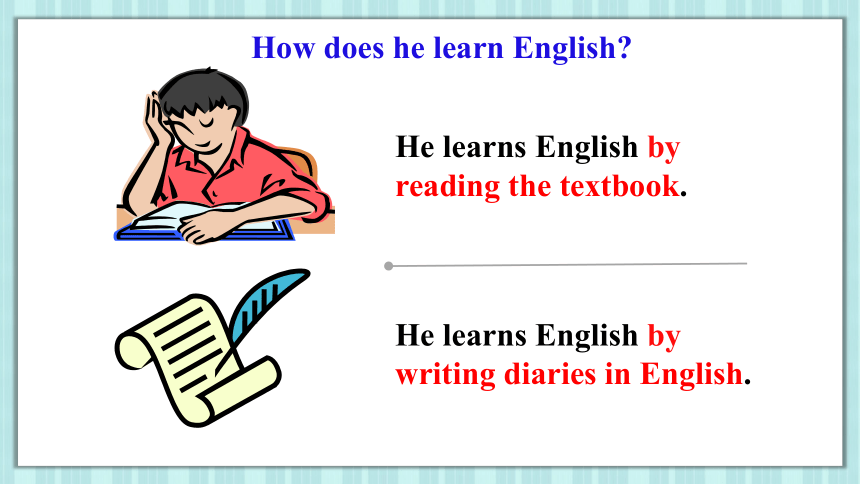
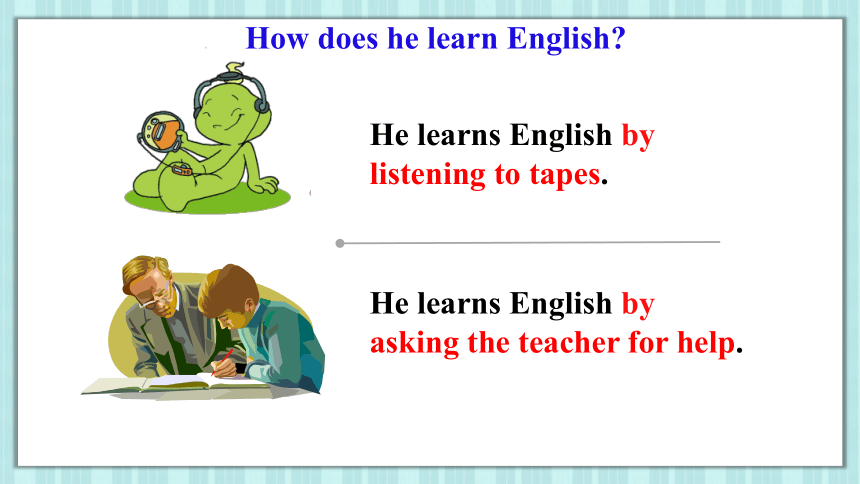



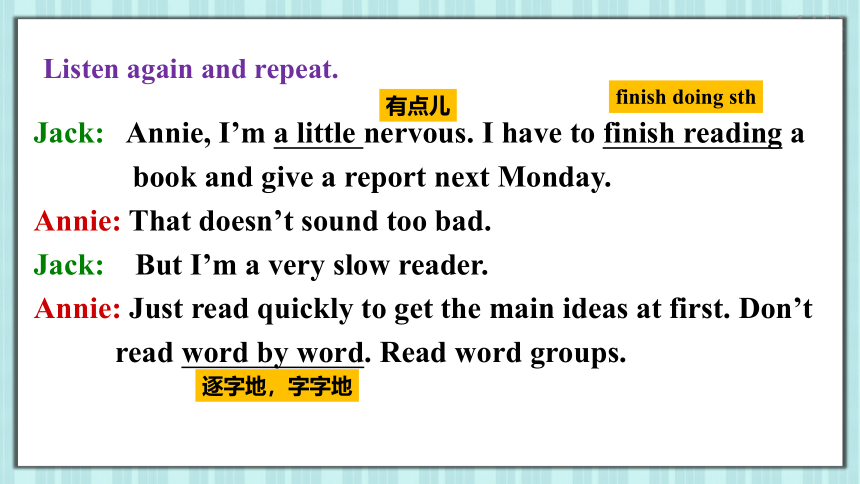
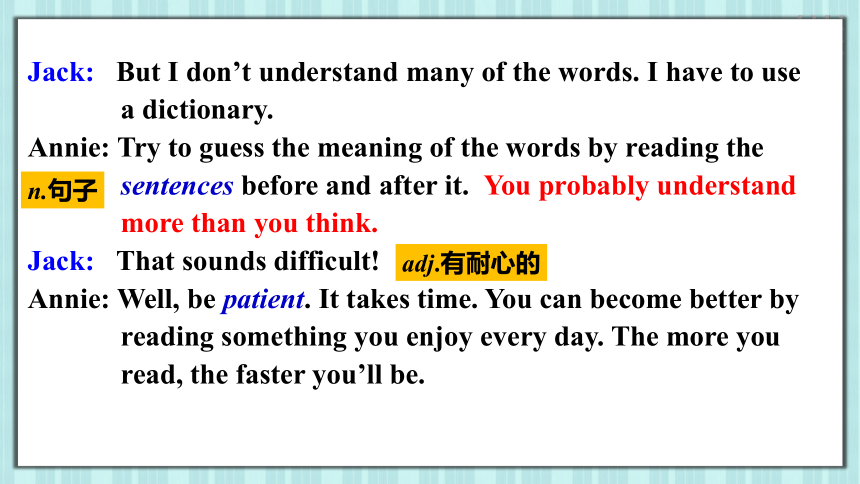
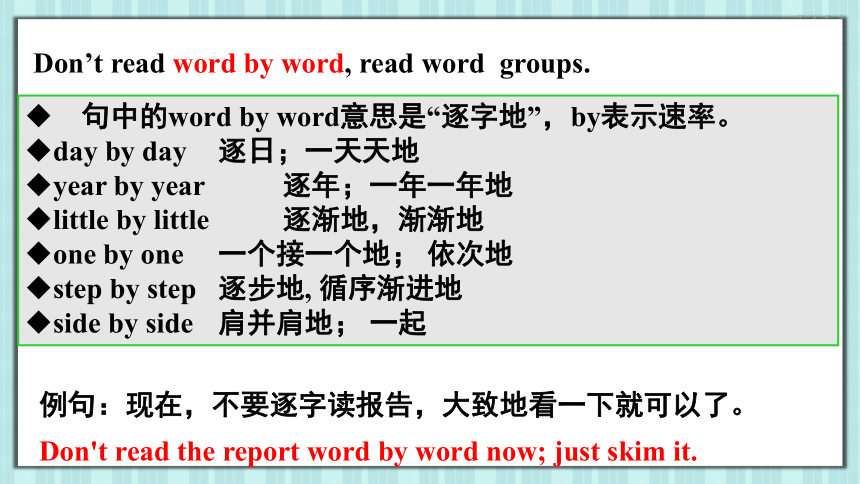
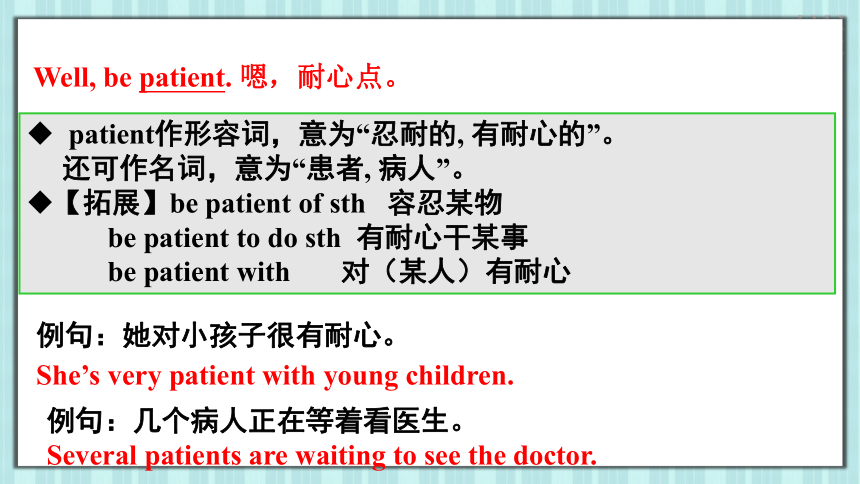

文档简介
(共43张PPT)
How can we become
good learners
Section A 2d+Grammar focus
Unit 1
She learns English by working with friends.
She learns English by
making word cards.
Review
How does she learn English
He learns English by reading the textbook.
He learns English by
writing diaries in English.
How does he learn English
He learns English by listening to tapes.
He learns English by
asking the teacher for help.
How does he learn English
He learns English by watching TV.
She learns English by
having conversations with foreigners.
How does he\she learn English
1. Do you like reading English books
2. Are you a slower reader or
fast reader
3. What problems do you meet
when you are reading
What problem may this boy have
The boy has to finish reading a book and give a report next Monday. But he’s a very slow reader.
He feels a little nervous.
How does Jack feel
2. What’s Annie’s suggestions to a slower reader
Just read quickly to get the main ideas at first.
Don’t read word by word. Read word groups.
Try to guess a word’s meaning by reading the sentences before and after it.
3. What should Jack do if he doesn’t understand many of the words
Read the conversation in 2d and answer the questions:
Jack: Annie, I’m a little nervous. I have to finish reading a
book and give a report next Monday.
Annie: That doesn’t sound too bad.
Jack: But I’m a very slow reader.
Annie: Just read quickly to get the main ideas at first. Don’t read word by word. Read word groups.
有点儿
Listen again and repeat.
逐字地,字字地
finish doing sth
Jack: But I don’t understand many of the words. I have to use
a dictionary.
Annie: Try to guess the meaning of the words by reading the
sentences before and after it. You probably understand
more than you think.
Jack: That sounds difficult!
Annie: Well, be patient. It takes time. You can become better by
reading something you enjoy every day. The more you
read, the faster you’ll be.
adj.有耐心的
n.句子
Don’t read word by word, read word groups.
句中的word by word意思是“逐字地”,by表示速率。
day by day 逐日;一天天地
year by year 逐年;一年一年地
little by little 逐渐地,渐渐地
one by one 一个接一个地; 依次地
step by step 逐步地, 循序渐进地
side by side 肩并肩地; 一起
例句:现在,不要逐字读报告,大致地看一下就可以了。
Don't read the report word by word now; just skim it.
Well, be patient. 嗯,耐心点。
patient作形容词,意为“忍耐的, 有耐心的”。
还可作名词,意为“患者, 病人”。
【拓展】be patient of sth 容忍某物
be patient to do sth 有耐心干某事
be patient with 对(某人)有耐心
例句:几个病人正在等着看医生。
Several patients are waiting to see the doctor.
例句:她对小孩子很有耐心。
She’s very patient with young children.
The more you read, the faster you’ll be.
你读书越多,你(读书的速度)就会越快。
“the+比较级+ ..., the +比较级+ ...”表示 “越……,就越……”
比较级的常见句型还有:
比较级+比较级 表示“越来越...”
例句:你学得越多,懂得的就越多。
The more you learn, the more you know.
例句:天气越暖,我就感觉越舒服。
The warmer the weather is, the better I will feel.
例句:中国正变得越来越强大。
China is becoming stronger and stronger.
Grammar Focus
How do you learn English
Do you learn English by reading aloud
How can I read faster
How can I improve my pronunciation
I learn by studying with a group.
Yes, I do. It helps my pronunciation.
You can read faster by reading word groups.
One way is by listening to tapes.
介词by的用法
表示方式、方法、手段等,by在此结构中有“通过、借助、用(某种方式或方法)”的含义。对“by+动词-ing形式”这一结构提问,用疑问词 how.
by + v.-ing 形式
Summary
①by+交通工具,意为“乘/驾驶/坐……”。
My father went to Beijing by plane last week.
②by+时间,意为“不迟于;在……之前”。
I must go to bed by ten o’clock.
③by+地点,意为“在……旁边;靠近”。
I like sitting by the river on fine afternoons.
by的其他用法
④意为“从……经过”
I walked by a lovely little garden this morning.
⑤用于被动语态,后接动作的执行者,意为“由;被”。
This book is written by Lu Xun.
by/in/with/ through表示“使用”
by
in
with
through
表示“通过……方法、手段”等。by doing sth. 意为“通过……(方法、途径)做某事”。
用某种语言或者表示衣着、声调等。
使用工具或身体部位等。
辨析
指间接手段,通过某人/物作为媒介达到目的,常译为“借助,通过”等。
Think and fill in the blanks.
He memorizes the text ______ reading aloud(用;通过......方法).
I write a letter ______ a pen. (用)
They talk _______ French. (用)
You can achieve success __________ hard word. (用;通过......方法)
by
with
in
through
1. How do you practice speaking
2. How do you learn new words
3. How do you improve your writing
4. How do you practice listening
5. How do you improve your pronunciation
6. How do you learn grammar
Answer the questions. Then match the questions and answers.
4a
1. How do you practice speaking
2. How do you learn new words
3. How do you improve your writing
4. How do you practice listening
5. How do you improve your pronunciation
6. How do you learn grammar
c
e
f
a
b
d
a. By watching English programs.
b. By listening to a tape and repeating out loud.
c. By having conversations with friends.
d. By taking notes, doing exercises and reading a lot.
e. By making word cards.
f. By writing e-mails to my pen pals.
math physics chemistry
Chinese history geography
e.g. I usually practice my English by taking notes / reading books and newspapers /speaking English with my classmates / memorizing sentence patterns.
Make sentences using the structure “do sth. by doing” with the subjects in the box and information that is true for you.
4b
memory n. 记忆
Check (√) what you do to learn English. Then interview your partner.
4c
I learn English by… My partner learns English by… yes no how often yes no how often
doing grammar exercises.
taking notes in English.
reading English books/magazines.
keeping a diary in English.
using an English dictionary.
…
A: Do you learn English by doing grammar exercises
B: Yes, I do.
A: How often do you do them
B: …
How can we become
good learners
Section B
1a-1d
Unit 1
Lead in
Lots of people are learning English.
Hi!
Make new friends.
People all over the world speak English.
Have fun traveling.
English is a major language in most countries.
Make you smarter.
Learning English is exercise for your brain.
Get more chances.
You will find a good job in the future.
English
is an offical language in 83 countries, and is widely spoken in 55 other countries.
Hi!
Everyone can learn English
well.
It is never
too old to learn English.
remember
Presentation
1a
Learning English can be difficult. What things are difficult for you Read the list. Check (√) the statements that are true for you.
________ I can’t pronounce some of the words.
________ I can’t always understand spoken English.
________ I don’t know how to increase my reading speed.
________ I can’t spell some English words.
________ I make mistakes in grammar.
在……(方面)犯错
1b
What other things are difficult for you Make a list.
1. I don’t know enough words to write well.
2. _________________________________________
3. _________________________________________
I can’t remember the new words.
I can’t understand the grammar.
Pair work
How can we solve these problems
I think you can ask the teacher or classmates for help. Listening to the tapes and repeating may help you a lot.
I can’t pronounce some of the words.
1c
Paul finds it difficult to learn English. Listen and complete the learning challenges he talks about.
Challenges
1. He can’t get the _____________ right.
2. He _____________ a lot of new words.
3. He can’t always _______________ when people talk to him.
4. He doesn’t get much ______________ practice.
pronunciation
forgets
understand
writing
1d
Listen again. Complete the solutions.
Solutions
1. __________ can help.
2. He can always _________________ in his notebook and study them at home.
3. He can __________________________ to practice speaking.
4. He should find a _________ to practice writing.
Listening
write the new words
join an English language club
pen pal
listening
material
Ms. Manson: You look worried, Paul.
Paul: I am, Ms. Manson. I’m having trouble learning English.
Ms. Manson: You said you liked English. What’s the problem
Paul: I can’t get the pronunciation right.
Ms. Manson: Well, listening can help. Why don’t you listen to English songs on the radio and repeat the difficult words
Paul: That’s a good idea. But what about all the new words I forget a lot of the new words.
Ms. Manson: You can always write the new words in your notebook and review them from time to time. You can even study on the subway on the way to school.
Paul: That might really help! Thanks.
Ms. Manson: Can you understand when people talk to you
Paul: Well, not always. Sometimes I just don’t understand what people are saying.
Ms. Manson: Why don’t you join an English language club to practice speaking English The English club meets after school on Tuesdays and Thursdays.
Paul: Maybe I’ll go. The only other problem is that I don’t get much writing practice.
Ms. Manson: Maybe you should find a pen pal.
Paul: That sounds like a fun way to practice writing. Thanks, Ms. Manson.
此处not always 表示“并非总是”。当not与both, always, all, everyone, everything等词连用时,表示部分否定。
1. I can’t always understand spoken English.(教材P5 )
Not everyone likes this book. 并非每个人都喜欢这本书。
He is not always so generous. 他并不总是如此慷慨。
Language Points
increase by “增长了”,后接百分比或分数。
increase to “增长到”,后接具体数字。
increase 作动词常用结构:
e.g. The hit of the video increased to 2 million. Compared with yesterday, it increased by 10 % .
这个视频的点击量增加到200万,与昨天相比增加了10%。
get在此处意为“使,让”。
4.He can’t get the pronunciation right.(教材P5 )
get+ 宾语+宾语补足语
He can’t get the pronunciation right.
主语
谓语
宾语
宾语补足语
1e
Role-play conversations using the information in 1c and 1d.
Maybe you should join an English club.
I don’t have a partner to practice English with.
How can we become
good learners
Section A 2d+Grammar focus
Unit 1
She learns English by working with friends.
She learns English by
making word cards.
Review
How does she learn English
He learns English by reading the textbook.
He learns English by
writing diaries in English.
How does he learn English
He learns English by listening to tapes.
He learns English by
asking the teacher for help.
How does he learn English
He learns English by watching TV.
She learns English by
having conversations with foreigners.
How does he\she learn English
1. Do you like reading English books
2. Are you a slower reader or
fast reader
3. What problems do you meet
when you are reading
What problem may this boy have
The boy has to finish reading a book and give a report next Monday. But he’s a very slow reader.
He feels a little nervous.
How does Jack feel
2. What’s Annie’s suggestions to a slower reader
Just read quickly to get the main ideas at first.
Don’t read word by word. Read word groups.
Try to guess a word’s meaning by reading the sentences before and after it.
3. What should Jack do if he doesn’t understand many of the words
Read the conversation in 2d and answer the questions:
Jack: Annie, I’m a little nervous. I have to finish reading a
book and give a report next Monday.
Annie: That doesn’t sound too bad.
Jack: But I’m a very slow reader.
Annie: Just read quickly to get the main ideas at first. Don’t read word by word. Read word groups.
有点儿
Listen again and repeat.
逐字地,字字地
finish doing sth
Jack: But I don’t understand many of the words. I have to use
a dictionary.
Annie: Try to guess the meaning of the words by reading the
sentences before and after it. You probably understand
more than you think.
Jack: That sounds difficult!
Annie: Well, be patient. It takes time. You can become better by
reading something you enjoy every day. The more you
read, the faster you’ll be.
adj.有耐心的
n.句子
Don’t read word by word, read word groups.
句中的word by word意思是“逐字地”,by表示速率。
day by day 逐日;一天天地
year by year 逐年;一年一年地
little by little 逐渐地,渐渐地
one by one 一个接一个地; 依次地
step by step 逐步地, 循序渐进地
side by side 肩并肩地; 一起
例句:现在,不要逐字读报告,大致地看一下就可以了。
Don't read the report word by word now; just skim it.
Well, be patient. 嗯,耐心点。
patient作形容词,意为“忍耐的, 有耐心的”。
还可作名词,意为“患者, 病人”。
【拓展】be patient of sth 容忍某物
be patient to do sth 有耐心干某事
be patient with 对(某人)有耐心
例句:几个病人正在等着看医生。
Several patients are waiting to see the doctor.
例句:她对小孩子很有耐心。
She’s very patient with young children.
The more you read, the faster you’ll be.
你读书越多,你(读书的速度)就会越快。
“the+比较级+ ..., the +比较级+ ...”表示 “越……,就越……”
比较级的常见句型还有:
比较级+比较级 表示“越来越...”
例句:你学得越多,懂得的就越多。
The more you learn, the more you know.
例句:天气越暖,我就感觉越舒服。
The warmer the weather is, the better I will feel.
例句:中国正变得越来越强大。
China is becoming stronger and stronger.
Grammar Focus
How do you learn English
Do you learn English by reading aloud
How can I read faster
How can I improve my pronunciation
I learn by studying with a group.
Yes, I do. It helps my pronunciation.
You can read faster by reading word groups.
One way is by listening to tapes.
介词by的用法
表示方式、方法、手段等,by在此结构中有“通过、借助、用(某种方式或方法)”的含义。对“by+动词-ing形式”这一结构提问,用疑问词 how.
by + v.-ing 形式
Summary
①by+交通工具,意为“乘/驾驶/坐……”。
My father went to Beijing by plane last week.
②by+时间,意为“不迟于;在……之前”。
I must go to bed by ten o’clock.
③by+地点,意为“在……旁边;靠近”。
I like sitting by the river on fine afternoons.
by的其他用法
④意为“从……经过”
I walked by a lovely little garden this morning.
⑤用于被动语态,后接动作的执行者,意为“由;被”。
This book is written by Lu Xun.
by/in/with/ through表示“使用”
by
in
with
through
表示“通过……方法、手段”等。by doing sth. 意为“通过……(方法、途径)做某事”。
用某种语言或者表示衣着、声调等。
使用工具或身体部位等。
辨析
指间接手段,通过某人/物作为媒介达到目的,常译为“借助,通过”等。
Think and fill in the blanks.
He memorizes the text ______ reading aloud(用;通过......方法).
I write a letter ______ a pen. (用)
They talk _______ French. (用)
You can achieve success __________ hard word. (用;通过......方法)
by
with
in
through
1. How do you practice speaking
2. How do you learn new words
3. How do you improve your writing
4. How do you practice listening
5. How do you improve your pronunciation
6. How do you learn grammar
Answer the questions. Then match the questions and answers.
4a
1. How do you practice speaking
2. How do you learn new words
3. How do you improve your writing
4. How do you practice listening
5. How do you improve your pronunciation
6. How do you learn grammar
c
e
f
a
b
d
a. By watching English programs.
b. By listening to a tape and repeating out loud.
c. By having conversations with friends.
d. By taking notes, doing exercises and reading a lot.
e. By making word cards.
f. By writing e-mails to my pen pals.
math physics chemistry
Chinese history geography
e.g. I usually practice my English by taking notes / reading books and newspapers /speaking English with my classmates / memorizing sentence patterns.
Make sentences using the structure “do sth. by doing” with the subjects in the box and information that is true for you.
4b
memory n. 记忆
Check (√) what you do to learn English. Then interview your partner.
4c
I learn English by… My partner learns English by… yes no how often yes no how often
doing grammar exercises.
taking notes in English.
reading English books/magazines.
keeping a diary in English.
using an English dictionary.
…
A: Do you learn English by doing grammar exercises
B: Yes, I do.
A: How often do you do them
B: …
How can we become
good learners
Section B
1a-1d
Unit 1
Lead in
Lots of people are learning English.
Hi!
Make new friends.
People all over the world speak English.
Have fun traveling.
English is a major language in most countries.
Make you smarter.
Learning English is exercise for your brain.
Get more chances.
You will find a good job in the future.
English
is an offical language in 83 countries, and is widely spoken in 55 other countries.
Hi!
Everyone can learn English
well.
It is never
too old to learn English.
remember
Presentation
1a
Learning English can be difficult. What things are difficult for you Read the list. Check (√) the statements that are true for you.
________ I can’t pronounce some of the words.
________ I can’t always understand spoken English.
________ I don’t know how to increase my reading speed.
________ I can’t spell some English words.
________ I make mistakes in grammar.
在……(方面)犯错
1b
What other things are difficult for you Make a list.
1. I don’t know enough words to write well.
2. _________________________________________
3. _________________________________________
I can’t remember the new words.
I can’t understand the grammar.
Pair work
How can we solve these problems
I think you can ask the teacher or classmates for help. Listening to the tapes and repeating may help you a lot.
I can’t pronounce some of the words.
1c
Paul finds it difficult to learn English. Listen and complete the learning challenges he talks about.
Challenges
1. He can’t get the _____________ right.
2. He _____________ a lot of new words.
3. He can’t always _______________ when people talk to him.
4. He doesn’t get much ______________ practice.
pronunciation
forgets
understand
writing
1d
Listen again. Complete the solutions.
Solutions
1. __________ can help.
2. He can always _________________ in his notebook and study them at home.
3. He can __________________________ to practice speaking.
4. He should find a _________ to practice writing.
Listening
write the new words
join an English language club
pen pal
listening
material
Ms. Manson: You look worried, Paul.
Paul: I am, Ms. Manson. I’m having trouble learning English.
Ms. Manson: You said you liked English. What’s the problem
Paul: I can’t get the pronunciation right.
Ms. Manson: Well, listening can help. Why don’t you listen to English songs on the radio and repeat the difficult words
Paul: That’s a good idea. But what about all the new words I forget a lot of the new words.
Ms. Manson: You can always write the new words in your notebook and review them from time to time. You can even study on the subway on the way to school.
Paul: That might really help! Thanks.
Ms. Manson: Can you understand when people talk to you
Paul: Well, not always. Sometimes I just don’t understand what people are saying.
Ms. Manson: Why don’t you join an English language club to practice speaking English The English club meets after school on Tuesdays and Thursdays.
Paul: Maybe I’ll go. The only other problem is that I don’t get much writing practice.
Ms. Manson: Maybe you should find a pen pal.
Paul: That sounds like a fun way to practice writing. Thanks, Ms. Manson.
此处not always 表示“并非总是”。当not与both, always, all, everyone, everything等词连用时,表示部分否定。
1. I can’t always understand spoken English.(教材P5 )
Not everyone likes this book. 并非每个人都喜欢这本书。
He is not always so generous. 他并不总是如此慷慨。
Language Points
increase by “增长了”,后接百分比或分数。
increase to “增长到”,后接具体数字。
increase 作动词常用结构:
e.g. The hit of the video increased to 2 million. Compared with yesterday, it increased by 10 % .
这个视频的点击量增加到200万,与昨天相比增加了10%。
get在此处意为“使,让”。
4.He can’t get the pronunciation right.(教材P5 )
get+ 宾语+宾语补足语
He can’t get the pronunciation right.
主语
谓语
宾语
宾语补足语
1e
Role-play conversations using the information in 1c and 1d.
Maybe you should join an English club.
I don’t have a partner to practice English with.
同课章节目录
- Unit 1 How can we become good learners.
- Section A
- Section B
- Unit 2 I think that mooncakes are delicious!
- Section A
- Section B
- Unit 3 Could you please tell me where the restroom
- Section A
- Section B
- Unit 4 I used to be afraid of the dark.
- Section A
- Section B
- Unit 5 What are the shirts made of?
- Section A
- Section B
- Review of Units 1-5
- Unit 6 When was it invented?
- Section A
- Section B
- Unit 7 Teenagers should be allowed to choose their
- Section A
- Section B
- Unit 8 It must belong to Carla.
- Section A
- Section B
- Unit 9 I like music that I can dance to.
- Section A
- Section B
- Unit 10 You're supposed to shake hands.
- Section A
- Section B
- Review of Units 6-10
- Unit 11 Sad movies make me cry.
- Section A
- Section B
- Unit 12 Life is full of the unexpected
- Section A
- Section B
- Unit 13 We're trying to save the earth!
- Section A
- Section B
- Unit 14 I remember meeting all of you in Grade 7.
- Section A
- Section B
- Review of Units 11-14
